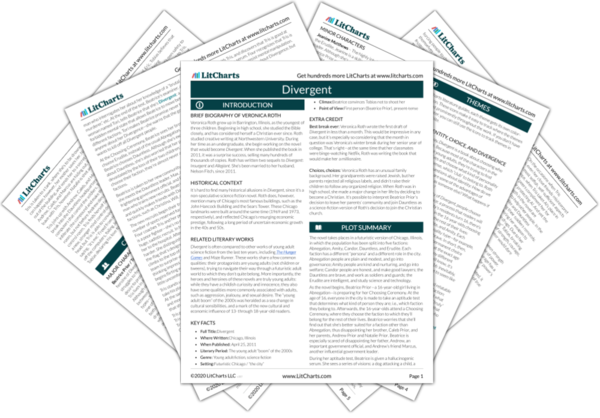Summary
Analysis
Beatrice makes her way home. Her neighborhood is full of houses that look exactly the same: a mark of Abnegation’s emphasis of plainness and simplicity. Beatrice has arrived home before Caleb. When Caleb arrives home, he’s accompanied by Susan Black and Susan’s brother, Robert. Beatrice knows that Caleb and Susan like each other—but they’re only allowed to flirt in the tepid way that the Abnegation community approves. Beatrice imagines that one day, Caleb will marry Susan.
Beatrice’s community, Abnegation, is Puritanical in all the predictable ways: sexuality is closely controlled, elaborate visual patterns or styles of any kind are forbidden, and an overall ethos of modesty and selflessness is praised above all else. One obvious drawback of this lifestyle (which the reader will probably notice right away) is that it limits human emotion and romance—Caleb and Susan are unable to express their true feelings and explore all the possibilities of life.
Themes
Caleb and Beatrice return to their house. Caleb asks Beatrice about her results, but she refuses to tell him. Silently, they prepare dinner for the family. After some time, their father and mother come home. Beatrice’s mother notes that she’s heard there was a problem with the testing that day—someone didn’t get a conclusive result, and had to leave early. Caleb and Beatrice say they know nothing about this.
Beatrice doesn’t tell her parents about her inconclusive results, and Caleb doesn’t mention that Beatrice has been behaving oddly all day, even if he can sense it. This is strangely appropriate for Abnegation: even though everyone at the table has something on their mind, nobody talks about their feelings, for fear of seeming selfish.
Themes
Beatrice’s father tells his family about his day at work. He works as a political leader alongside his friend Marcus: the city is ruled by 50 such political leaders. This has been the status quo in the city, ever since the five factions made a “Great Peace,” years ago. Today, Beatrice’s father says, an Erudite named Jeanine Matthews released a government report attacking Marcus’s character; i.e., accusing him of being violent and cruel to his son, Tobias—a boy who chose to join Dauntless instead of Abnegation. Beatrice’s father claims that the Erudites have been releasing lots of reports like this lately. He says that the Erudites, with their fancy knowledge and intelligence, are jealous of Abnegation’s simplicity and plainness.
This is an important expository section, in which we learn that the city is ruled by a large council. We also begin to understand why the city is divided into factions in the first place: there’s peace in this dystopian Chicago, supposedly due to the separation of the city into five sub-groups that balance each other out. It’s obvious that this is an uneasy peace at best, however—even though there’s no war, the factions despise each other, and all this tension naturally seems to foreshadow chaos and disorder to come. We can also tell that Tobias will be an important character, based simply on the fact that Beatrice mentions him for no apparent reason.
Themes
As Beatrice sits at the dinner table, she tries to make sense of her test. She still has to make a decision: which faction to join. She could be courageous and choose Dauntless, or selfless and choose Abnegation. Tomorrow she’ll have to make a choice of some kind.
From the reader’s perspective, Beatrice’s decision is doomed from the start: there’s no way for a 16-year-old teenager (or anyone, for that matter) to choose an oversimplified identity for herself without inviting disappointment and frustration. In a way, Beatrice will spend the next 200 pages arriving at this exact conclusion.
Themes
Get the entire Divergent LitChart as a printable PDF.













